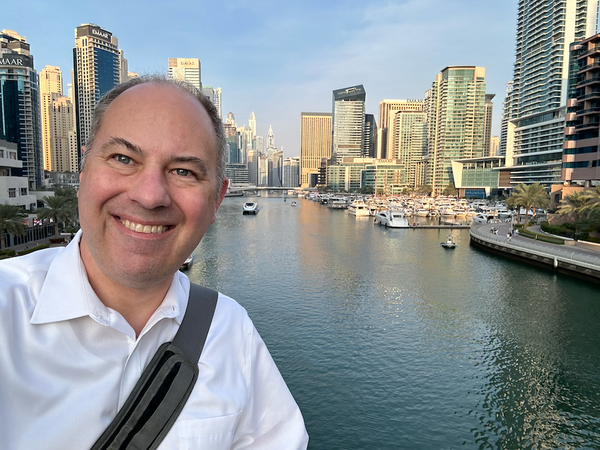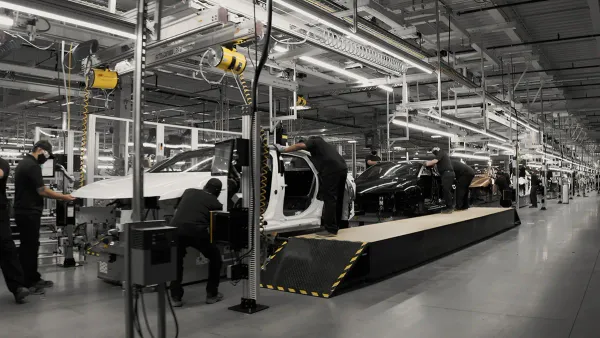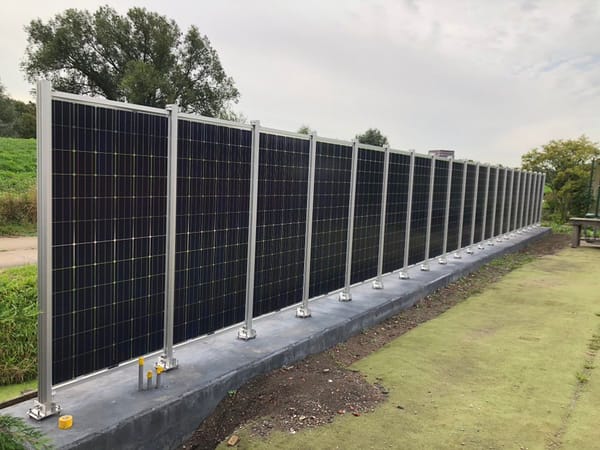Developing country finances are now a top climate negotiating point
First in a series of five expected COP28 issues
Good Afternoon,
With just a few more days to go on my Kickstarter to Dubai, my family and I have made the decision to fund the remaining portion. It’s not a small amount – a few thousand dollars – but I strongly believe in the project and my family is supporting me. I am ever grateful to them, for this and so many reasons.
But if you haven’t already joined, I’d like to make one more pitch: Toss in $30 and every day (even weekends) you’ll receive daily reports from me in Dubai from November 30 to December 12. I’ll include pictures, reporting on what’s happening with negotiations, as well as my observations on the activity and people of the U.N.’s biggest climate meeting. I don’t anticipate breaking any news, but I do think I’ll be able to describe something different from the usual fare about a big diplomatic meeting.
Thank you to those who have already signed up! And if you haven’t already, your support would be greatly appreciated.
-Mike
Today continues the second deep dive on major expected issues for the climate negotiations, on developing country financing. If you’re just catching up, here’s past links and future plans:
Oct. 19 – The four major issues shaping up COP28, plus one more
Oct. 20 – Why we’re talking about abatement instead of fossil fuel phase out
Today – Developing country finances are now a top climate negotiating point
Oct. 26 – The Global Stocktake results – and the role of carbon capture
Oct. 31 – Green energy financing, where will it come from?
Nov. 2 – Concerns surrounding the COP28 president
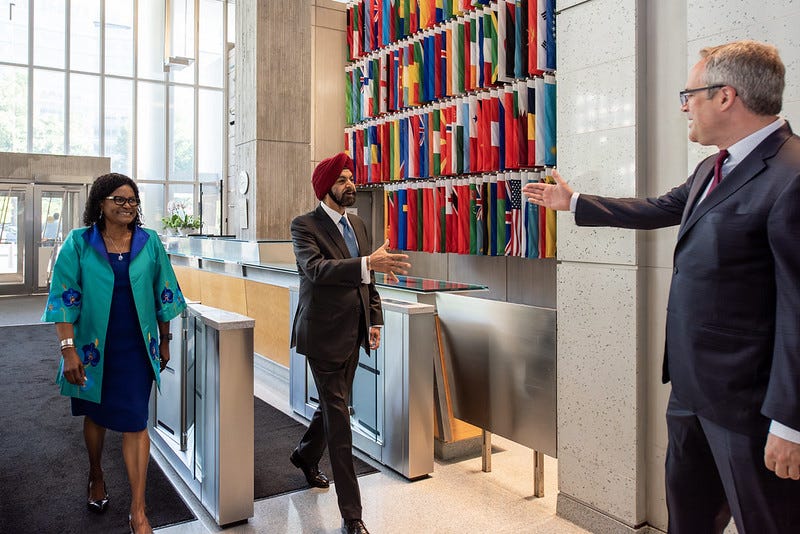
When discussing its impacts, it’s common to say, “climate affects everything”. Usually someone is talking about ecological or environmental impacts, but for fragile economies that depend on stable ecologies, climate impacts the finances of and almost every waking hour of human populations. Truly, for these developing countries, “climate affects everything.”
Because of this, and because the number of negotiators representing developing countries vastly out numbers the developed world (by 155 to 43) a large part of the climate discussion has become about how developing countries will pay to build new, green economies and to rebuild from the damage that continues to be done by climate-fuel natural disasters, known as “loss and damage”. And, as it turns out, the direction provided to climate negotiators is extremely broad, according to its founding 1992 document, United Nations Framework Convention on Climate Change.
The treaty directs signatories “to promote a supportive and open international economic system that would lead to sustainable economic growth and development in all Parties,” which could pretty much mean anything the negotiators manage to agree to (a high bar, since all negotiation results have been consensual so far). It also includes this language: “developing country Parties, that would have to bear a disproportionate or abnormal burden under the Convention,” which essentially means countries like the U.S. or from the E.U. will have to pay most of the bill.
And this year’s negotiations, after years of dodging by the rich countries, looks like when we’re going to finally start talking about how things are going to get paid for.
What’s happening?
It makes sense that we have to pay the bill. But from a Western perspective, the growing focus on financing developing countries may seem like a kind of hijacking of climate change. I tried to address that disconnect a month ago, in my essay, “How development and trade liberalization became climate issues”
If you ask someone from a developing country about climate change, they’ll first tell you that less than 10% of historic carbon emissions have come from the developing world. The second thing they’ll say is that the conversion to green economies seems like a way to cheat developing countries out of the cheaper fossil fuel systems the Western world has been using for decades. And one more thing, they’ll want to tell you, all the rising seas, big hurricanes and drought are the developed world’s fault. Who will help the developing world deal with that?
From a developing world perspective the global need to shift to green is an attack on their economies in two directions: One, because climate problems are a result of pollution by Westerners, and two, because now that they’re finally beginning to build semi-reliable energy systems, Westerner pollution is making them shift to a whole, new expensive green system.
To compensate, developing country leaders are looking for funding to do three things:
- Developing a green economy;
- Make payments for “loss and damages” due to climate change; and
- Pay down existing debts.
The cost of converting to a green economy will require Western government seed money (more on that next week). Meanwhile, the argument over paying existing debts and making payments for loss and damages have not been going well, since last week’s meeting over loss and damages payments in Aswan, Egypt ended without resolution.
The loss and damages concept was a surprise, last minute agreement at last year’s COP27, where rich countries agreed to pay US$100 billion a year to a fund that would compensate developing countries for climate related damages, such as rising sea level, persistent drought, flooding. Aswan’s staff-level meeting was supposed to agree to terms that could be brought to COP28 in Dubai for ministers to agree on, but they couldn’t agree on which countries would get priority for funding, who would fund how much, and what organization would manage the funding.
Another staff-level pre-meeting is scheduled for next week, but the biggest sticking point, that the U.S. wants the loss and damage fund to be managed by the World Bank, is an indicator of many problems with financing the developing world.
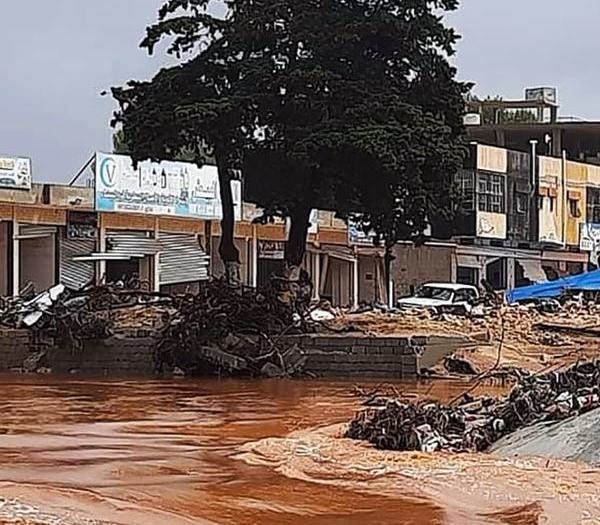
What are the politics?
Developing countries are acutely aware of the financial disparities between themselves and the developed world. Namely, they are struggling to build their countries under crushing debt loads with interest rates much higher than developed countries pay. Development funds are provided in the form of debt, not equity, so if projects go poorly, they’re on the hook for it, which is not how it goes for most new economic projects in the developed world, where if a project goes badly, you just declare bankruptcy and everyone goes home.
Aware of the developed world’s increasing interest in going green, developing countries have gotten strategic about their debt politics, as I addressed a couple weeks ago:
Last month’s African Climate Week concluded with a joint statement by attending countries calling for debt relief and freer markets. It was a diplomatic cri de coeur that developing countries would love to help solve the climate problem, but they have some more immediately pressing problems.
Namely, they have a bunch of debt they need to pay and economies to grow, or else their populations might overturn their governments. Who cares about climate change when you can’t eat?
Who will control the money?
The main organization that oversees development financing is the World Bank, based in Washington, D.C. and primarily controlled by the United States. There’s no developing country that has good feelings about the World Bank (Argentina’s presidential election right now is basically about how much everyone hates the World Bank), since just about every other lending institution follows its lead, and the World Bank’s terms often mean countries are required to slash domestic subsidies for the sake of paying interest on the Bank’s loans.
But nobody else, including the Chinese, has the World Bank’s phalanx of analysts tasked with understanding the opaque economies of developing countries, as well as a financial structure that can manage $100 billion a year of funds. For comparison, Nigeria, Africa’s second largest economy, will have a US$28 billion government budget this year. Developing countries, who are demanding a new organization be built and controlled by them to manage the funds, don’t have either a record of or the capacity for managing this amount of lending.
At some point, a compromise will have to be made where perhaps the U.S. decides who holds the money and developing countries decide the terms of how it gets lent out.
Meanwhile, developing countries want their existing national debts canceled or renegotiated to interest rates comparable to what Western countries pay. Here again, the World Bank is a leading figure since it either holds much of the debt these countries owe, or it sets terms other lenders follow.
Developing countries are making it clear that unless they get their demands, more money with less control from and interest paid to rich countries, they aren’t going to support other climate goals in U.N. meetings.
What’s the money angle?
We’re talking about giant buckets of money here. US$100 billion a year for loss and damage. Last month I calculated that total developing country debt adds up to about US$3 trillion. Assuming 20% of that would have to be written off (an optimistic number, maybe?), about $600 billion. That amount of forgiven debt would roil the world’s bond and currency markets, but also possibly boost development and consumer spending.
What’s the likely outcome?
The loss and damage funding would more than likely end up in the pockets of favored contractors in the various countries. Some amount would be skimmed off the top for leaders, with an eventual trickle down into the people’s pockets. It’s hard to imagine a way for the loss and damage fund to not end up like that somehow.
Of course, the inertia is for nothing to change – The developed world may seek a more controlled system where their favored development banks lend more money and cancel more debts.
Other Things Happened
- The biggest carbon capture project in the U.S. is a bust.
- The E.U.’s energy analysis agency projects we’ll hit peak fossil fuel usage by 2030.
- No matter what we do now, it looks like climate change will melt the West Antarctic ice shelves.
You reached the bottom of the email! Here’s how romance novel covers have changed over time.
Thank you for reading Heat Rising. This post is public so feel free to share it.


